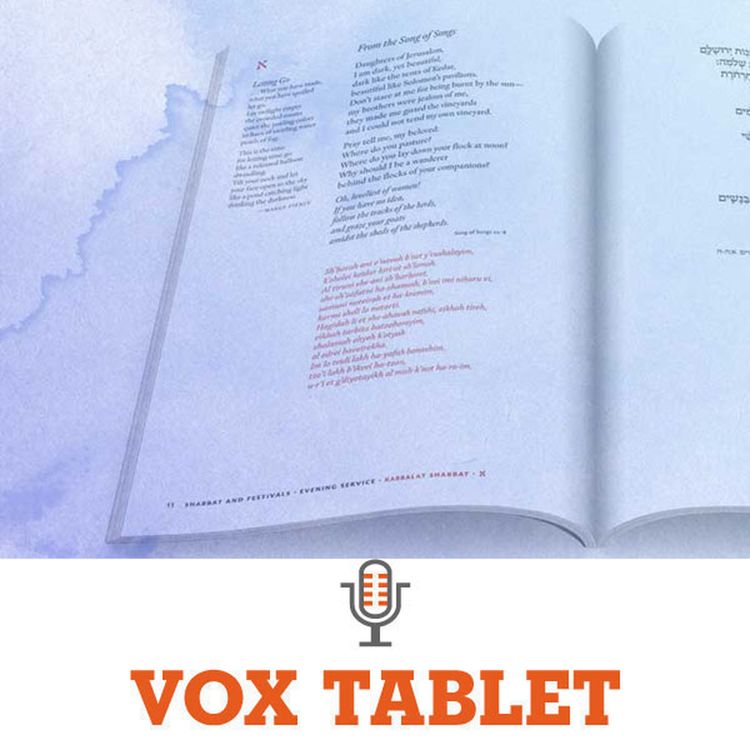Share

Vox Tablet
A New Kind of Prayerbook
•
Earlier this year, the Rabbinical Assembly of the Conservative movement put out a new prayer book, or siddur. Siddur Lev Shalem, which means ‘full heart,’ is full of innovations. There are new translations of traditional prayers. Poems are included. There are commentaries on different parts of the Sabbath and holiday services. There are straightforward explanations of simple rites and gestures, like when and why to bow during the Amidah. The last time the Conservative movement published a new siddur was 15 years ago—not so very long. What compelled rabbis to put together a new siddur so soon? How does it differ from what preceded it?
Rabbi Edward Feld, who oversaw the creation of Siddur Lev Shalem, joins Vox Tablet host Sara Ivry to talk about the whats, whys, and hows behind this new prayer book.
More episodes
View all episodes

So Long, Farewell
42:33|Since 2005, the Vox Tablet team—producer Julie Subrin and host Sara Ivry—have done our best to create a Jewish podcast with conversations, stories, and reports from across the Jewish cultural world. But good things—even pioneering, award-winning podcasts—come to an end, and their makers move on to new adventures elsewhere. In our final episode, we take a brief walk down memory lane to some of our favorite moments from the past decade. Among highlights we feature are our visits with actor Fyvush Finkel; illustrator and author Roz Chast; Silver Jews’ frontman David Berman; tourists en route to the Statue of Liberty; South African justice Albie Sachs; attendees at an annual deli luncheon in a small Mississippi town; Israeli musician Noam Inbar; and West Side Story aficionado Alisa Solomon.
Louis Brandeis: The Jewish Boy From Kentucky Who Became a Supreme Court Legend
31:19|Exactly a century ago, President Woodrow Wilson nominated Louis Brandeis to the Supreme Court. After a contentious confirmation process, he became the first Jewish justice, serving on the bench for 23 years. His rulings on privacy, workers’ rights, and free speech feel as relevant today as they did when he issued them, and his foresight, wisdom, and clear-spokenness cemented his reputation as nothing short of a visionary. In Louis D. Brandeis: American Prophet, writer Jeffrey Rosen explores Brandeis’s personal and professional life. He joins Vox Tablet host Sara Ivry to discuss the influence Thomas Jefferson had on Brandeis—known as the "Jewish Jefferson," the justice’s ruling in Whitney v. California—a landmark free speech case, and why Brandeis is uniquely relevant in the fractious political climate of our day.
Tanya's Story
47:50|Tanya Zajdel grew up in a Hasidic family in Montreal and was excited to embark on her life as a wife and mother after marrying a charismatic rabbinical student when she was 19. It didn’t take long, though, for Tanya to realize that her marriage was not going to be as she’d expected. No matter how hard she tried to live up to the ideal of the perfect Jewish wife—supportive, modest, an upholder of shalom bayit, or “peace in the home”—her husband responded with increasingly volatile and sometimes violent behavior. It took Tanya a long time to figure out how to do the right thing for herself and her family. This is her story, brought to us by producers Shea Shackelford andTori Marlan. A warning to sensitive listeners: This piece includes descriptions of violence.
Hey Mister DJ, Put a (Diaspora-Blending, Genre-Bending) Record On
24:17|Rob Weisberg, the host of the world music radio program Transpacific Sound Paradise, joins Vox Tablet host Sara Ivry to talk about a trio of new genre-bending projects: A-Wa, Sandaraa, and Schizophonia. A-Wa are Israeli sisters of Yemeni ancestry who invoke the music of legendary singer Ofra Haza. Sandaraa joins Pashtun songs from Pakistani singer Zeb Bangash with the Eastern European klezmer clarinet of Michael Winograd. And Schizophonia, a project of guitarist Yoshie Fruchter, reconceives cantorial songs by setting them in a rock and roll context. Weisberg shares a bit of background about each project and we listen in for ourselves to these energetic and riveting sounds.
From Kooky Waif to A-List Beauty: The Story of Barbra StreisandUntitled Episode
29:45|Barbra Streisand turns 75 next year. In her 50-plus year career, she has made her mark on the silver screen, on Broadway, in nightclubs, and on the record charts. Her beginnings were humble—she grew up poor and scrappy in Brooklyn with a mother and stepfather who were far from encouraging, and knew early on that she wanted to be a star regardless of her unconventional looks and comportment. How did she do it? What was the source of her broad appeal? And why does she stand out as a unique cultural figure in the landscape of so-called ethnic performers? Writer Neal Gabler tackles these and other questions in Barbra Streisand: Redefining Beauty, Femininity, and Power, a new title in Yale University Press’s Jewish Lives Series. Gabler joins Vox Tablet host Sara Ivry to discuss Streisand as an ersatz Christ figure, how she has functioned as a metaphor for American Jewishness, and the deep debt she's owed by Melissa McCarthy and Adele.
What's Free Will Got To Do With It?
24:57|Especially in election season, we love talking about the moral fiber (or lack thereof) of our candidates. But when it comes to ethics, no man—or woman—is an island. Host Sara Ivry talks to Professor of Religious Studies Heidi Ravven about the myth of "free will," and how neuroscience along with philosophical traditions from Aristotle to Maimonides to Spinoza may offer more useful ways for us to think about how to foster ethical behavior and moral societies.
Builders of a New Jerusalem
43:01|Host Sara Ivry talks to writer Adina Hoffman about her new book, Till We Have Built Jerusalem, which brings to life three architects who transformed the city in the days of the British Mandate.
Bathe in the Waters
28:49|Traditionally, Orthodox Jews submerge themselves in mikvehs—ritual baths—to purify themselves. Producer Hannah Reich has always been drawn to water—to rivers, oceans, pools—and was fascinated by the idea that ritual submersion sanctifies the sexual relationship between a man and a woman. At the same time, though, she was conflicted over how such an act can be reconciled with feminism and acceptance of the body as is. Through mikveh visits and in conversations with the ‘Mikvah Lady’ of Melbourne, the first female rabbi in the Southern Hemisphere, and other Jewish women, she explores these questions in “Immersion.” This documentary first aired on the program Earshot from the Australian Broadcasting Corporation.